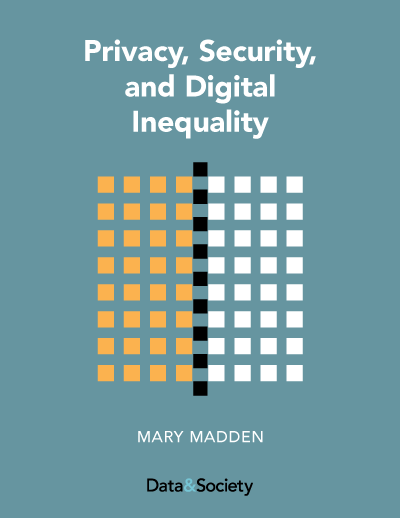“Privacy, Security, and Digital Inequality” by Mary Madden is the first in-depth analysis of the privacy and security experiences of low-socioeconomic-status populations in the United States.
Supported by the Digital Trust Foundation, the report finds that most of those living in U.S. households with annual incomes of less than $20,000 per year are acutely aware of a range of digital privacy harms, but many say it would be difficult to access the tools and strategies that could help them protect their personal information online. The report provides additional insights about mobile device use and demand for digital privacy and security training.
In light of the September 18th announcement by the U.S. Department of Homeland Security[1] about federal agencies’ intent to collect social media information and search history from a variety of immigrant groups, “Privacy, Security, and Digital Inequality” is especially relevant: In particular, the report finds that foreign-born Hispanic adults stand out for both their privacy sensitivities, and for their desire to learn more about safeguarding their personal information.
“Privacy, Security, and Digital Inequality” includes detailed comparisons across different racial, ethnic, and nativity groups, finding that there are substantial gaps across these groups when looking at reliance on mobile connectivity.[2]
“This study highlights the disconnect between the one-size-fits-all conversations about privacy-related risk that happen in Washington and the concerns that are most salient to the communities who have long experienced a disproportionate level of surveillance and injustice in their daily lives,” said Madden, Researcher at Data & Society and lead author of the report. “When those who influence policy and technology design have a lower perception of privacy risk themselves, it contributes to a lack of investment in the kind of safeguards and protections that vulnerable communities both want and need.”
In light of new pressures surrounding immigration policy and status in the United States, the report is a highly relevant snapshot of the demand for privacy- and security-related training among some of the most vulnerable of these low-socioeconomic-status groups. The report also finds a disproportionate reliance on mobile devices, offering a potential starting point for those looking to provide educational resources.
“This report illustrates the many ways in which smartphones have become an indispensable source of internet access for those who may lack other technology resources in their homes and communities,” said Michele Gilman, Venable Professor of Law at the University of Baltimore and Director of the Saul Ewing Civil Advocacy Clinic. “Far from being a luxury, smartphones—with their many benefits and vulnerabilities—offer a critical source of connection to jobs, family, education and government services.”
Gilman, a poverty law expert, also served on the Research Advisory Board for the two-year research project, and co-authored a related law review article with Madden titled, “Privacy, Poverty and Big Data: A Matrix of Vulnerabilities for Poor Americans.”
“Privacy, Security, and Digital Inequality,” is based on newly-released data from a nationally-representative telephone survey of 3,000 American adults. The survey, which included interviews in both English and Spanish, was made possible by a grant from the Digital Trust Foundation and fielded in November and December of 2015.
[1] Full text here.
[2] The analysis of racial and ethnic minority groups in this report is limited by the survey sample size, and does not include detailed comparisons of Asians, Native Americans, and other subgroups. For instance, in this survey, out of 3,000 respondents, just 3% identified as Asian or Asian American.
Additional Resources
For more information about groups working on these issues and in these spaces, we invite you to take a look at resources provided by the following organizations. We welcome additional suggestions:
Center for Media Justice – Resource Library
Equality Labs
Freedom of the Press Foundation (link goes to resources)
American Civil Liberties Union – Privacy and Technology, Free Speech
Berkman Klein Center
Color of Change
EPIC – Electronic Privacy Information Center
Future of Privacy Forum
Georgetown Center on Privacy & Technology (link goes to resources)
National Hispanic Media Coalition
Our Data Bodies (link goes to resources)
Pew Research Center
Public Knowledge
Rad.Cat (link goes to resources)
Southern Poverty Law Center


